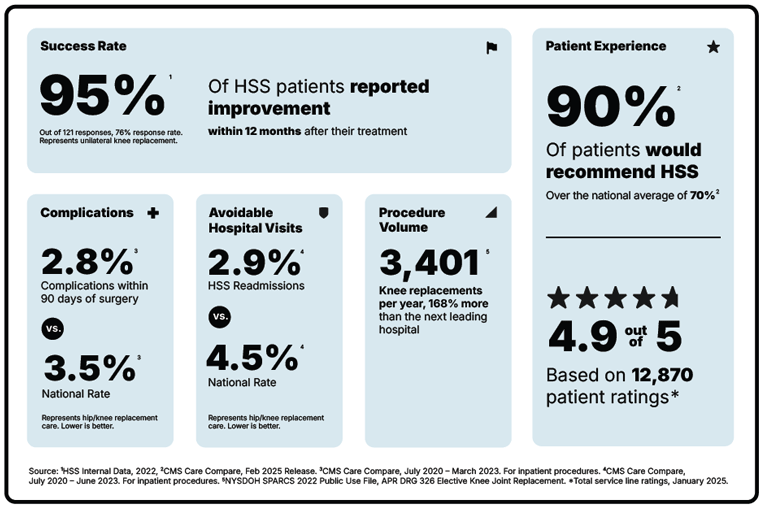How Do You Know if You Need a Knee Replacement?
Knee replacement is a surgery that’s done to treat osteoarthritis of the knee. This type of knee arthritis is a condition that occurs as people get older, when the cartilage that provides cushioning in the bones of the knee joint begins to degenerate and wear away. This causes the bones to rub together, resulting in significant pain. It also can lead to inflammation and swelling, which may affect your ability to bend and straighten your leg.

Degeneration of the cartilage in the knee may be worse or occur earlier in life if you have had a prior knee injury. Obesity can also make it more severe since there is more weight being placed on the joints.
The term “knee replacement” may sound scary to some people. It makes the surgery sound very different from what it actually is. What we do in a modern knee replacement is replace the surfaces of the knee joint, not the joint itself. The tendons, ligaments and all the other structures around the knee are left in place. I sometimes compare it to a dentist capping a tooth: We are adding new caps to the bones.
Here are a few questions to help you determine whether you might need a knee replacement and if so, which type.
Could a nonsurgical option for knee arthritis be right for you?
If you’re having problems with pain and swelling due to knee osteorthritis, there are a number of nonsurgical treatments you can try. Anti-inflammatory drugs such as ibuprofen, certain exercises to strengthen the muscles around the knee and injections offer relief for many people.
If these measures work for you, you don’t need to have surgery. But if it gets to the point where you’re staying home because it hurts too much to walk, or you’re unable to do simple activities like climbing stairs, it may be time to seriously consider having knee replacement surgery.
Ask the Expert: Dr. Tony S. Shen explains total knee replacement
When arthritis wears down the cartilage in your knee, pain and limited mobility can make everyday life challenging. Tony S. Shen, MD, hip & knee surgeon at HSS, explains what knee replacement really does - who’s an ideal candidate, what to expect during surgery, and why choosing an experienced team matters for the best outcome.

An HSS Orthopedic Surgeon Explains Knee Replacement
Do you meet the criteria for a total knee replacement?
To qualify for a knee replacement, you need to meet two major requirements. One is that you have a significant amount of cartilage loss. This is usual evaluated by taking X-rays of the knee while you are in a standing position. The loss of cartilage is seen as narrowing of the space between the knee bones. The other is that the loss is bad enough that it’s having a negative impact on your quality of life – due to pain, limited function or a combination of the two.
Usually by the time people come to one of the knee replacement surgeons at HSS, they have tried everything else and are ready to have surgery.
Could a partial knee arthoplasty work for you?
The knee is divided into three compartments:
- the medial compartment (the inside of the knee joint)
- the lateral compartment (the outside of the knee joint)
- the patellofemoral compartment – the joint where the patella (kneecap) meets the femur
If you have a problem in only one of the three compartments, you may be able to have what is called a partial knee replacement. Since only one area of the knee is resurfaced, recovery from partial knee replacement is faster. Because many patients have arthritis in more than one knee compartment, the majority of people who undergo knee replacement surgery about – 90% – need to have all three compartments resurfaced. This is called a total knee replacement, or total knee arthroplasty.
Should you have both knees done at the same time?
Many people with osteoarthritis have problems with both knees, but usually one knee is worse than the other. Most people have surgery on one knee at a time, though some patients want to have surgery on both knees at the same time. The plus side of this is that you only need one operation, but the downside is that it’s a harder, slower recovery.
There are strict criteria for having both knees operated on at the same time, including being in overall good health and being motivated to undergo a more difficult recovery. Learn more by reading Expert Advice on Bilateral Knee Replacement.
Why you should choose HSS for knee replacement
Knee replacement is a surgery focused on reducing pain and getting you back to the activities you love. But not all hospitals achieve the same results. Some are more reliable than others. With the help of the HSS Hospital Reliability Scorecard, you can make sure you're asking the critical questions to find the hospital that's right for you. Understanding the data points will help you make the best decision for your care. See hospital reliability data


